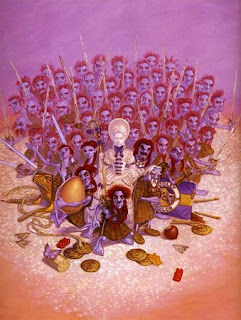 A few nights ago, Braveheart was on television. I can now definitively add that film to my list of dangerous night-time movies—dangerous, because I invariably happen across them at that listless channel-flicking moment when I'm just beginning to overcome couch-induced inertia and go to bed. And then I start watching a movie I've seen before. More often than not, what then happens is I sit up much later than I had planned, constantly thinking "OK, now I will go to bed," but unable to move because I just can't look away.
A few nights ago, Braveheart was on television. I can now definitively add that film to my list of dangerous night-time movies—dangerous, because I invariably happen across them at that listless channel-flicking moment when I'm just beginning to overcome couch-induced inertia and go to bed. And then I start watching a movie I've seen before. More often than not, what then happens is I sit up much later than I had planned, constantly thinking "OK, now I will go to bed," but unable to move because I just can't look away.(Other films in this category include both Star Wars trilogies, all Star Treks except numbers one and five, The Green Mile, Underworld, any John Hughes film, anything involving predators or aliens, and anything starring Humphrey Bogart ... who. it must be said, would probably flinch to be included in the preceding company. However, the all-time winner for repeat offender is Tremors, that wonderfully awful Kevin Bacon film about subterranean carnivorous slugs. What is everyone else's late-night compulsive viewing?)
For the record, I think Braveheart is a terrible film, albeit a very pretty one that makes me want to go back to Scotland. Watching it the other night reaffirmed my original assessment, which was that this unbearably long three-and-something hour historical epic could have been tightened up into a tidy and relatively inoffensive ninety-minute popcorn flick if Gibson had simply played all the slo-mo sequences at regular speed. Seriously. While I love haunting Celtic music as much as the next third-generation Canadian of Scottish and Irish extraction, to say Gibson lays it on a little thick is a wee bit of an understatement. Indeed, to quote the best film review ever written, this film looks down on over-the-top as if from a great height.
(Incidentally, has anyone else noticed that Mel Gibson seems to have a disturbing thing for torture? Braveheart, Payback, The Passion of the Christ, Apocalypto—all films with rather excruciating torture sequences.)
Braveheart was however made more amusing to me because I was midway through Carpe Jugulum when I watched it the other night, and the high seriousness of Gibson's self-consciously epic film was undercut by the thought of the Nac Mac Feegle. The Nac Mac Feegle, or "wee free men," are described in The Folklore of Discworld as follows:
To humans, they are one of the most feared of the fairy races—indeed, they can put trolls to flight, and even Nanny Ogg's cat Greebo retires under the furniture at the sight of them. They have shaggy red hair, and are covered all over with blue tattoos and blue paint, in patterns which indicate their clan. They wear kilts or leather loincloths, use feathers, bones or teeth as decorations, and carry swords almost as large as themselves—though they go in for kicking and head-butting too. They are about six inches tall.
The Nac Mac Feegle make several appearances in Carpe Jugulum. Technically, they are pixies—or, in the proper spelling, "pictsies." Har. They speak—or rather, shout—in a more or less incomprehensible brogue, and steal cattle. Nanny Ogg describes their livestock-thieving procedure:
Four. One under each foot. Seen 'em do it. You see a cow in a field, mindin' its own business, next minute the grass is rustlin'. Some little bugger shouts "Hup, hup, hup," and the poor beast goes past, voom! without its legs movin'. Backwards, sometime. They're stronger'n cockroachers. You step on a pictsy, you'd better be wearin' good thick soles.
The funniest sequence in the novel comes when the Nac Mac Feegle rescue King Verence of Lancre. The main plot of Carpe Jugulum is about a family of vampires who smoothly take over the kingdom of Lancre by essentially hypnotizing everyone they come into contact with. Verence is relegated to his bedchamber under non-vampire but still nasty mercenary guard. The Feegle come to liberate him.
[Verence] could hear very faint voices, apparently coming from somewhere below his pillow.
"Rikt, gi' tae yon helan bigjobs?"
"Ach, fashit keel!"
"Hyup?"
"Nach oona whiel ta' tethra ... yin, tan, TETRA!"
"Hyup! Hyup!"
Something rustled on the floor. The chair of one man jerked up into the air and bobbed at speed to the window.
"Hyup!" The chair and its occupant crashed through the glass.
The other guard managed to get to his feet, but something was growing in the air in front of him. To Verence, an alumnus of the Fools' Guild, it looked very much like a very tall human pyramid made up of very small acrobats.
"Hup! Hup!"
"Hyup!"
"Hup!"
It grew level with the guard's face. The single figure at the top yelled: "What ya lookin' a', chymie? Ha' a wee tastie!" and launched itself directly at a point between the man's eyes. There was a little cracking noise, and the man keeled over backwards.
Now, perhaps I'm speaking just for myself here, but you've got to love dialogue that reads like a Robbie Burns poem.
At any rate, as I watched Braveheart the other night, I found myself giggling every time Mel Gibson intoned one of William Wallace's sententious speeches, as in my head I heard the Nac Mac Feegle saying "Waley, waley, waley! Seeyu? Grich' ta' bones outa t'is yan! Hakkis lugs awa'! Bigjobs!"
I recommend reading Carpe Jugulum, if for no other reason than its efficacy as an antidote should you ever find yourself watching Braveheart late at night. It makes the movie ever so much more entertaining.
